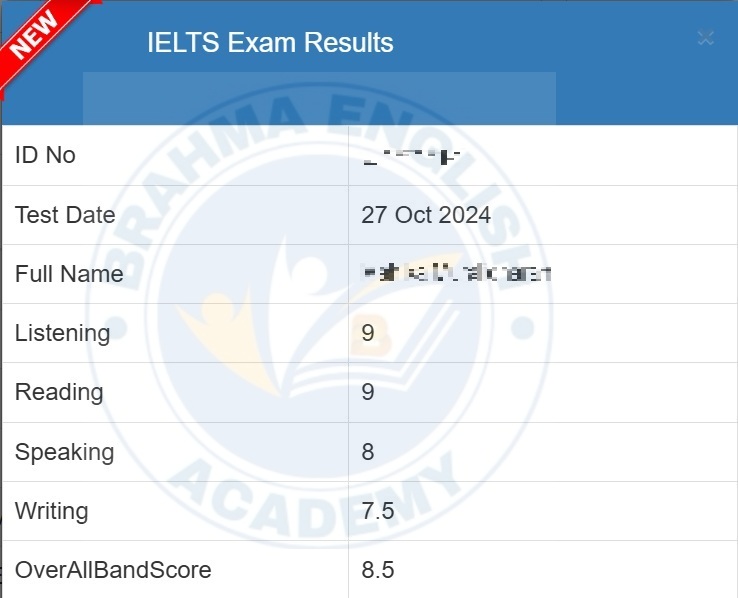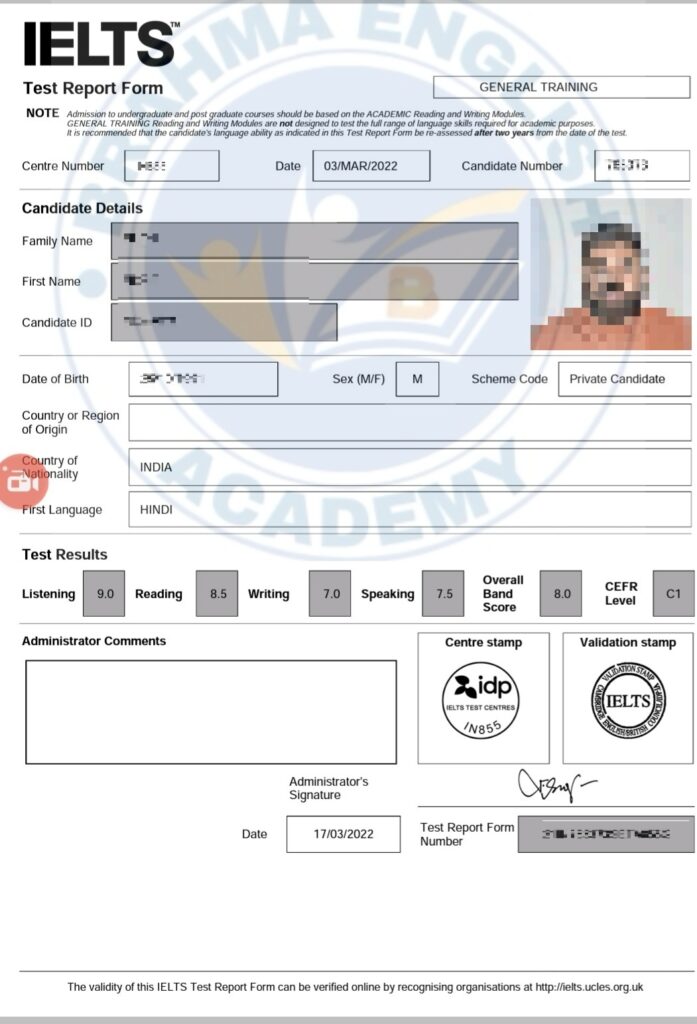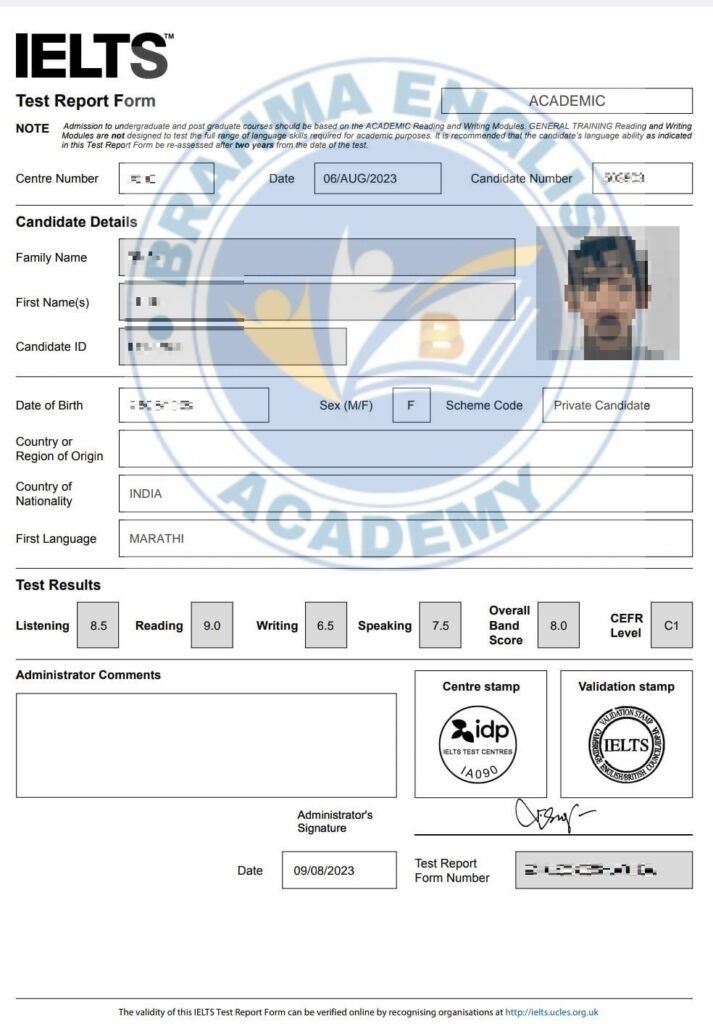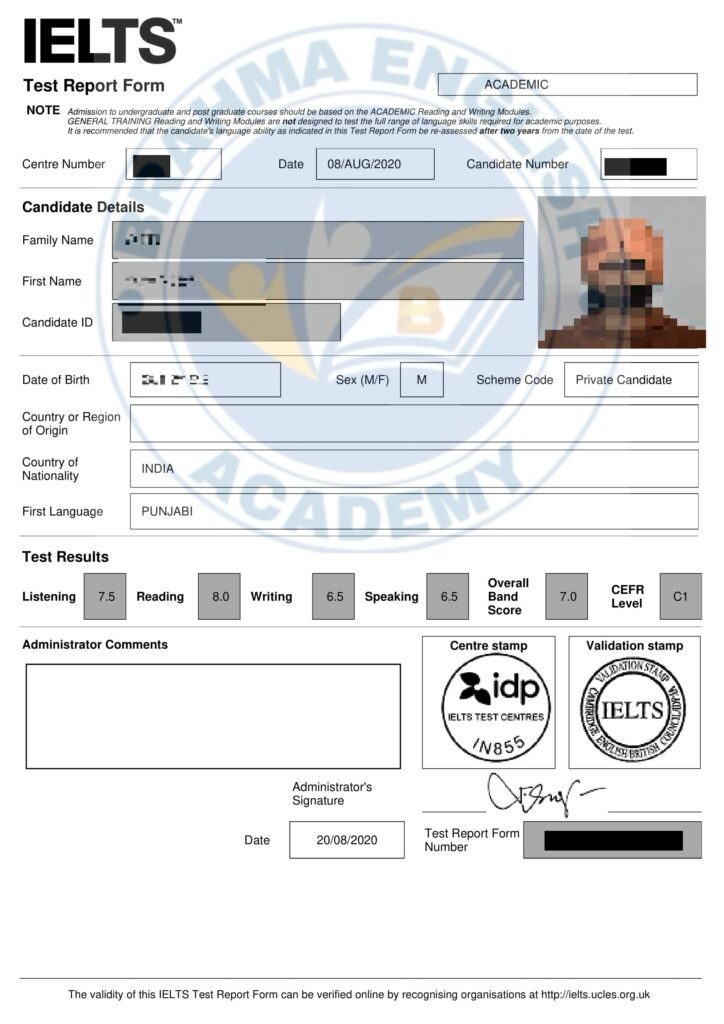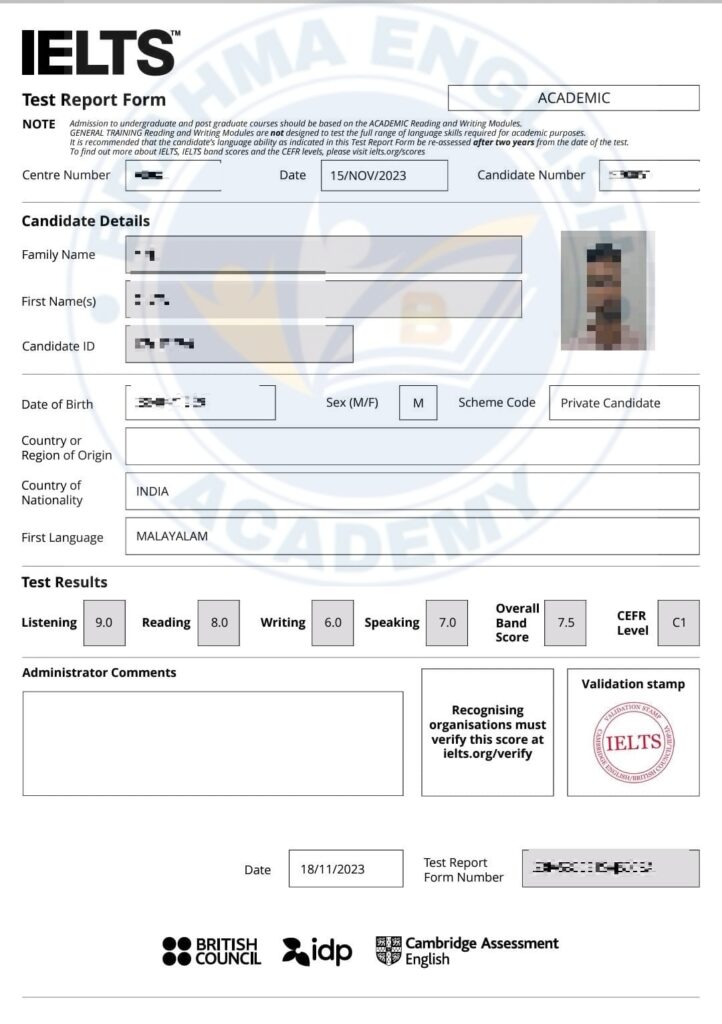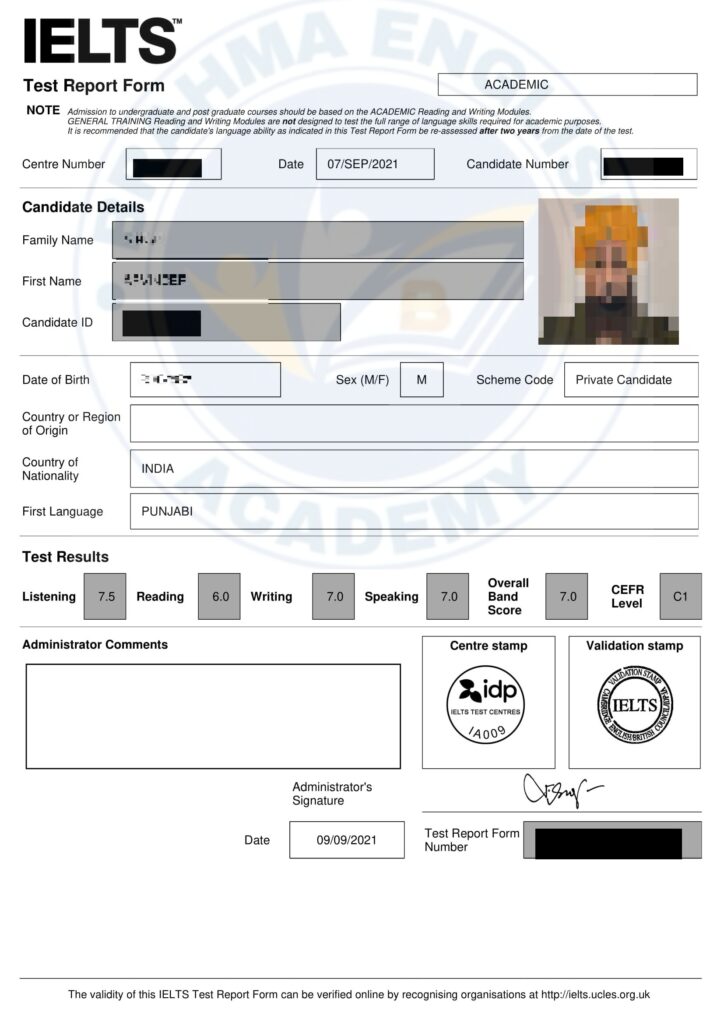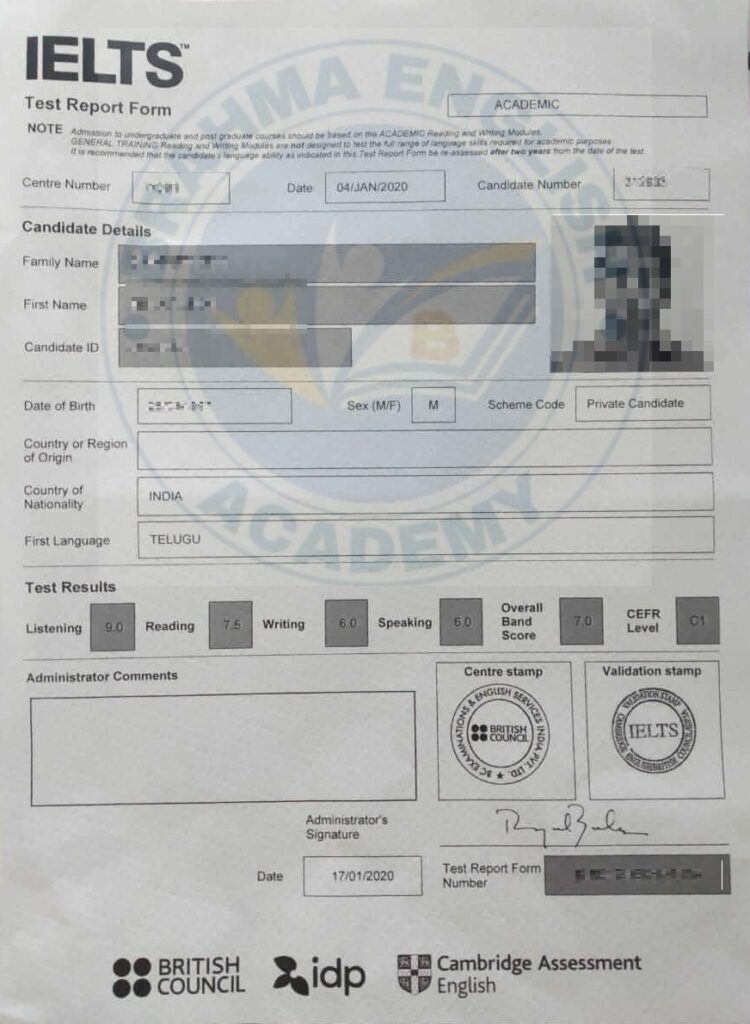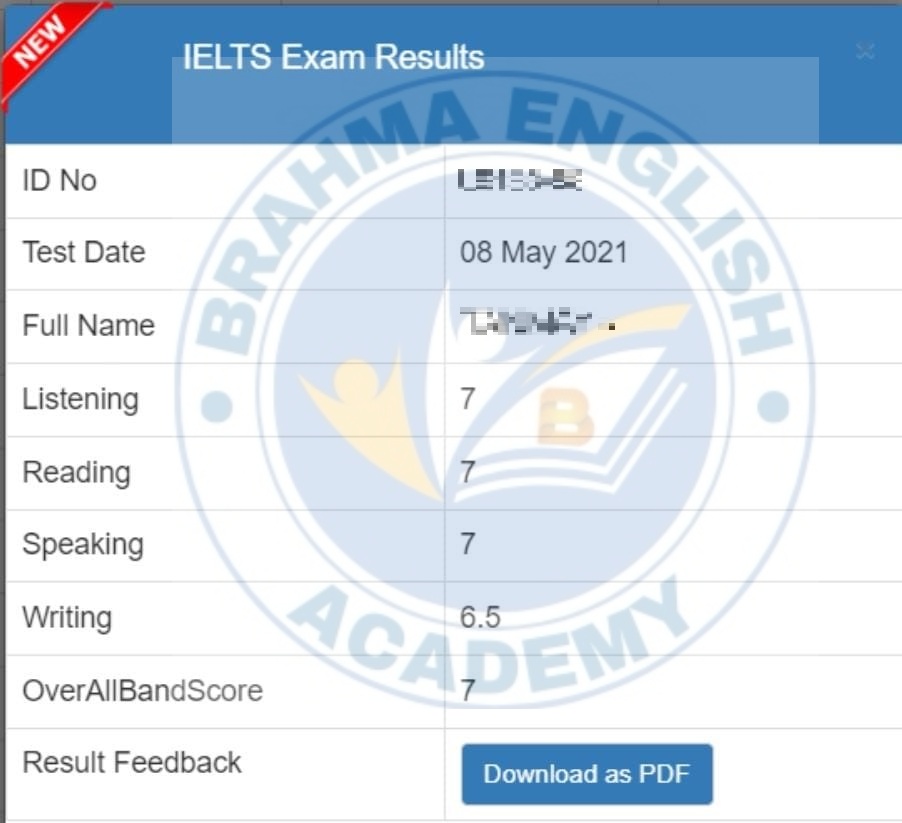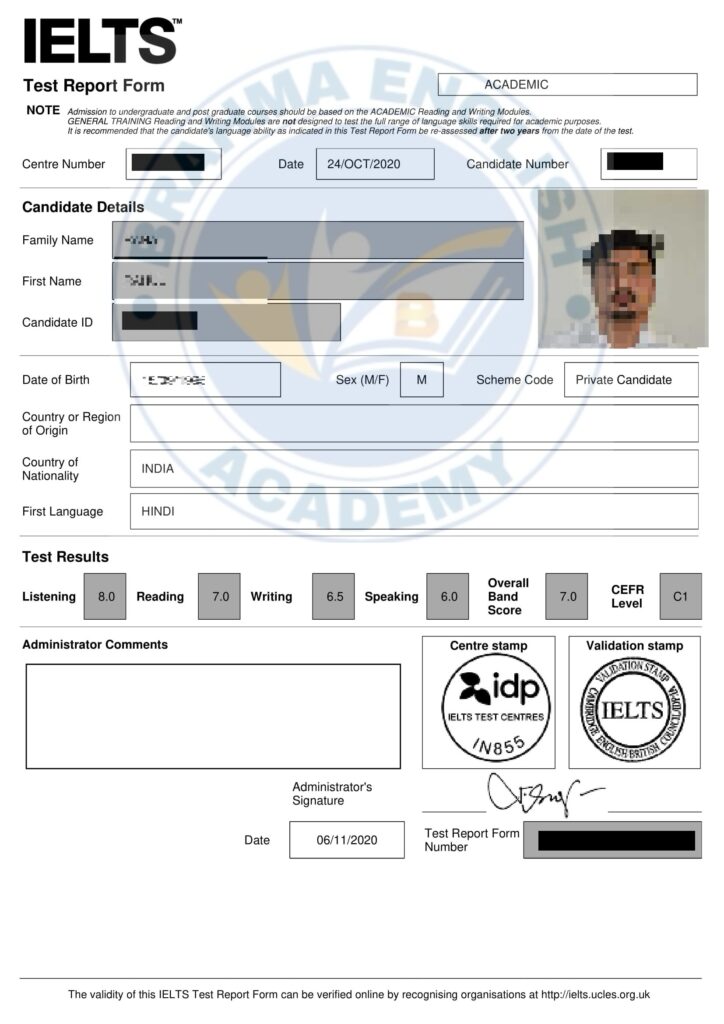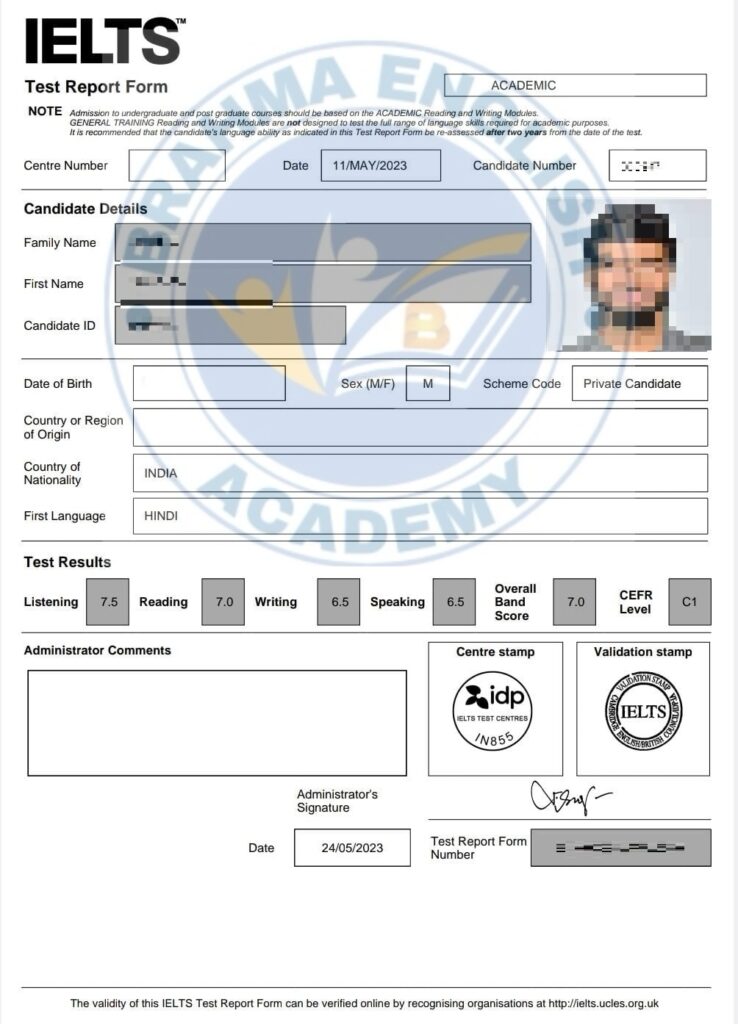
British Council Certified Trainers
Free Live Demo Session
Small Batch
Size
Personal & Group Batches
30 Hrs Grammar & Vocabulary sessions
Online & Offline Batches
Flexible Batch
Timings
Get Personal
Attention
Paper & Computer Based Real Mock Tests
Personal Detailed Feedback & Evaluation
Desired Band Guarantee
15+ Cambridge Official IELTS Books & App
The IELTS (International English Language Testing System) is a standardized English language proficiency test designed for non-native English speakers. It assesses a person’s ability to use English in listening, reading, writing, and speaking. The test is jointly managed by British Council, IDP: IELTS Australia, and Cambridge Assessment English.
IELTS is available in two main formats:
Modules:
IELTS is recognized by over 11,000 organizations worldwide, including:
Duration: 30 minutes (plus 10 minutes to transfer answers to the answer sheet)
Number of Questions: 40
Structure: Divided into 4 sections, with increasing difficulty.
Duration: 60 minutes
Number of Questions: 40
The reading syllabus differs for Academic and General Training versions:
There are 3 sections- Total 3 paragraphs
Section 1- 1 long paragraph: 13-14 Q
Section 2- 1 long paragraph: 13-14 Q
Section 3- 1 long paragraph: 13-14 Q
Section 1- 2 small paragraphs: 13-14 Q
Section 2- 2 small paragraphs: 13-14 Q
Section 3- 1 long paragraph: 13-14 Q
Questions Types
Duration: 60 minutes
Number of Tasks: 2 tasks (Task 1 and Task 2)
Duration: 11–14 minutes
Structure: Divided into 3 parts.
IELTS Coaching in Pune Course Details are given below
| Details | Information |
|---|---|
| Course Duration | 2 Months (8 weeks) |
| No. of Classes in a Week | 6 lectures (From Monday to Saturday) |
| Daily Class Duration | 2 hours |
| Every Saturday | Weekly Mock Tests |
| Details | Information |
|---|---|
| Course Duration | 2 Months (8 weeks) |
| No. of Classes in a Week | 2 (Saturday & Sunday) |
| Class Duration | 8 hours (4 hours Saturday & 4 hours Sunday) |
| Every Saturday | Weekly Mock Tests |
| Morning | Afternoon | Evening |
|---|---|---|
| 8am - 10am | 1pm - 3pm | 5pm - 7pm |
| 9am - 11am | 2pm - 4pm | 6pm - 8pm |
| 10am - 12pm | 3pm - 5pm | 7pm - 9pm |
| Morning | Afternoon | Evening |
|---|---|---|
| 8am - 10am | 1pm - 3pm | 5pm - 7pm |
| 9am - 11am | 2pm - 4pm | 6pm - 8pm |
| 10am - 12pm | 3pm - 5pm | 7pm - 9pm |
Timing: 4 Hours Saturday and 4 Hours Sunday
| Morning | Evening |
|---|---|
| 9am - 1pm | 4pm - 8pm |
| 9am - 1pm | 4pm - 8pm |
| Offline Batch | Online Batch |
|---|---|
| Fees: 11999/- | Fees: 9999/- |
| 100 Hours Live Training | 100 Hours Live Training |
| Small Batch Size | Small Batch Size |
| 15+ Cambridge IELTS Official Books (Hard Copies) | 15+ Cambridge IELTS Official Books (Soft Copies) |
| Regular Feedback and Evaluation | Regular Feedback and Evaluation |
| Weekly Mock Tests Analysis | Weekly Mock Tests Analysis |
| One-on-one Speaking Analysis | One-on-one Speaking Analysis |
| 30+ Hours Grammar & Vocabulary Sessions | 30+ Hours Grammar & Vocabulary Sessions |
| 10 Comprehensive Real Mock Tests | 10 Comprehensive Real Mock Tests |
| Special Writing Sessions for Task-1 and Task-2 | Special Writing Sessions for Task-1 and Task-2 |
| Strategies to Score 7+ Band | Strategies to Score 7+ Band |
| Details | Information |
|---|---|
| Course Duration | 1 Month (4 weeks) |
| No. of Classes in a Week | 6 lectures (From Monday to Saturday) |
| Daily Class Duration | 2 hours |
| Every Saturday | Weekly Mock Tests |
| Details | Information |
|---|---|
| Course Duration | 1 Month (4 weeks) |
| No. of Classes in a Week | 2 lectures (Saturday & Sunday) |
| Class Duration | 4 hours (4 hours Saturday & 4 hours Sunday) |
| Every Saturday | Weekly Mock Tests |
| Offline Batch | Online Batch |
|---|---|
| Fees: 11999/- | Fees: 9999/- |
| 50 Hours Personal Live Training (One-on-One) | 50 Hours Personal Live Training (One-on-One) |
| 15+ Cambridge IELTS Official Books (Hard Copies) | 15+ Cambridge IELTS Official Books (Soft Copies) |
| Regular Feedback and Evaluation | Regular Feedback and Evaluation |
| Weekly Mock Tests Analysis | Weekly Mock Tests Analysis |
| One-on-One Speaking Analysis | One-on-One Speaking Analysis |
| 30+ Hours Grammar & Vocabulary Sessions | 30+ Hours Grammar & Vocabulary Sessions |
| 10 Comprehensive Real Mock Tests | 10 Comprehensive Real Mock Tests |
| Special Writing Sessions for Task-1 and Task-2 | Special Writing Sessions for Task-1 and Task-2 |
| Strategies to Score 7+ Band | Strategies to Score 7+ Band |
No. IELTS gives you a band score between 0 and 9. There’s no fail or pass; your result depends on the requirement of the institution or immigration authority you're applying to.
Yes, but only the Academic version is available as IELTS Online in select countries. Most candidates still need to go to an authorized test centre.
Bring the original identification document you used when booking your test (commonly your passport). Entry won’t be allowed without it.
No, watches are not allowed inside the exam room. You’ll have access to a visible wall clock during the test.
Yes, both versions are accepted. You can use either, but make sure to be consistent throughout your answers.
Very important! Grammar affects your accuracy, fluency, and coherence — all key elements in scoring well.
No. Unlike the paper-based test, there is no separate transfer time. You type your answers directly as the test progresses.
Yes, you can politely ask once if you didn’t hear or understand. But they can’t explain or give the meaning of the question.
If you don’t inform in advance, you’ll be marked as absent and won’t get a refund. If it was due to a valid emergency, rescheduling may be possible with evidence.
Absolutely! Using all capital letters is permitted and can help avoid problems with unclear handwriting.
Academic test takers describe visual data and write formal essays. General Training involves letter writing and an essay on a common topic.
You’ll need: • The same ID you used for registration (usually a passport) • Pencils, erasers, and pens (for paper-based test) • Leave your mobile, bags, and personal items outside the exam room.
No breaks are permitted during Listening, Reading, or Writing. Only in the Speaking test might a short pause be allowed under specific conditions.
There’s no restriction. You can retake the exam as often as needed.
Not always. It might be held on the same day or up to 7 days before or after the main test, based on centre availability.
No. You cannot use dictionaries or any reference material. Everything must come from your personal knowledge.
It varies depending on the country and course. For example, UK universities often need a 6.0–6.5, while Canadian institutions may ask for 6.0–7.0.
Yes. If you feel your score is unfair, you can apply for a re-mark through an Enquiry on Results (EOR), for a fee.
Definitely! IELTS is recognized by employers and immigration departments in countries like Australia, Canada, the UK, and New Zealand.
This is a specific IELTS test approved by UK Visas and Immigration for visa-related purposes. The format is the same but conducted at UKVI-approved centres.
It’s a test for those applying for UK family visas. It checks only Speaking and Listening, not Reading or Writing.
Each section is graded on a band scale from 1 to 9. The overall score is the average of the four section scores.
Possibly. Academic IELTS is generally required for education, while General Training is used for immigration. Choose the version based on your goal.
IELTS is accepted in more than 140 countries, including top destinations like the USA, UK, Canada, Australia, and New Zealand.
In many cases, yes. Centres often allow candidates to choose a Speaking slot within 7 days of the written tests, depending on availability.












